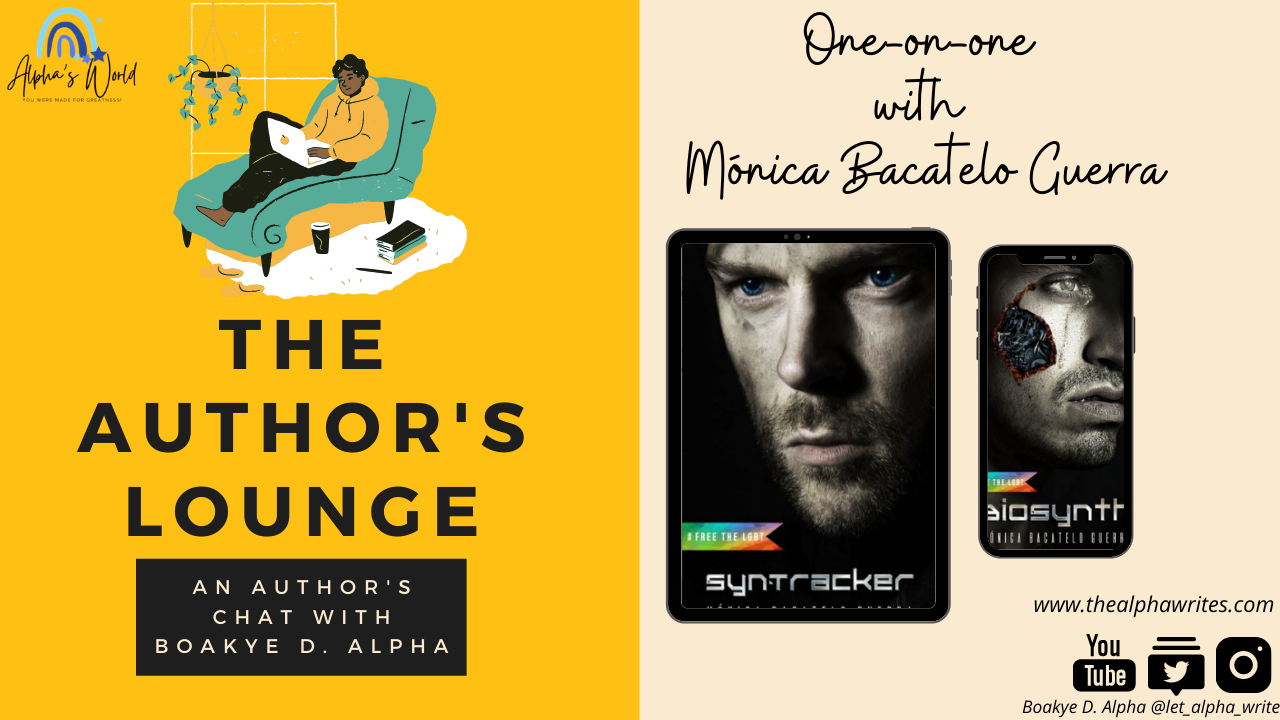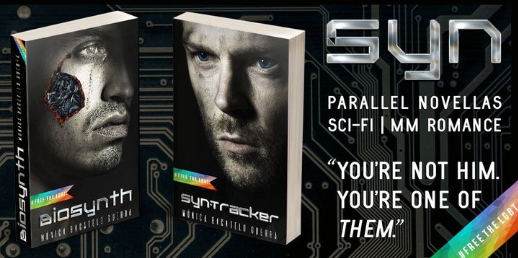12 | Author chat with Mónica Bacatelo Guerra

[The trailer]
https://youtu.be/nMb_5Kjidfs

First, congratulations to you for joining this year's ONC!
Thank you! The ONC is beyond a shadow of a doubt my favourite time of the year on Wattpad.
It sure is mine as well! So, tell me. How has the experience been so far?
Exhilarating, chaotic, and with a terrific sense of community.
This is exactly why I love the ONC so much: unlike the Wattys, where you hit submit and then hear nothing until the results are announced, the ONC has stages (rounds, round winners, longlist, shortlist, final winners)) and people band together on the hype train.
It's a time to discover new authors, to read and comment on each other's works every week, to interact with readers, to basically be on the same hype train. I've been lucky enough to have some amazing novellas brought to my awareness, and I can't wait to have my own entry written far enough that I can delight in reading them.
It's also been chaotic because I've set myself on the path to a new experiment -- to write twin novellas, both telling the same story but following different PoVs, to update them on the same day, and the challenge is to make them compelling enough for people who might want to read both, while at the same time making sure they stand on their own so that people following along one or the other aren't left lacking information that they should have.
Talking about writing two Novellas for the ONC, that was a bold decision. What motivated you?
Honestly, it's not the fact that it's two novellas that motivated me -- I know writers juggling as many as four which, while I admire (read: envy their ability), I don't think I could pull off at all -- but the fact that it's *twin, parallel* novellas.
Because, with Syn, for a good amount of time, both characters have very different thoughts on what's going on. Each of them assumes quite a bit, under the circumstances, and when you only read one you're getting a heavily biased view until their storylines converge. When you read both, you have more information than the characters do, and I think that enhances the experience of reading it. But, to answer your question, what motivated me was the challenge of telling the same story in two different ways, and to release both in serialised format enhances the experience of reading it.
Impressive! How is your writing process like?
In a word? Opportunistic. In a few more words? Chaotic, haphazard and a lot like an exorcism.
I'll elaborate: it's opportunistic and chaotic because I have four kids, I'm taking classes that eat up six hours of my day, and that's before assignments come into the equation. Most of my writing happens on my phone in a markdown editor (the one I use is called IA Writer, but there are plenty of others out there) in stolen five-minute slots wherever I can hide. Like the bathroom, for instance, which is exactly where I'm writing portions of this reply.
Then I pick it up on my computer in a different markdown editor (it used to be IA Writer too, but I purchased it for my Android phone, purchased it for my old MacBook, and, when the mac failed and I knew I'd have to get a PC instead, I refused to pay a third time for the same app. I found an editor called Typora, which is free while in beta, and I honestly like it enough that I'm highly likely to purchase it when it gets its first official release, provided the price doesn't break my bank) and the doc is there waiting for me, in the exact same spot I left it on my phone because I've linked both apps to Dropbox. I purchased Scrivener last year, but I haven't used it for more than the corkboard feature especially because of its native lack of cloud support.
Anyway, this is the tech portion of my writing process.
The *writing* portion of my writing process is this: I'm a pantser at heart. I've tried to change it for the Syn novellas because a few people whose writing I admire a great deal swore by Save the Cat and three-act structure and, with tight deadlines and even tighter wordcounts, the ONC felt like a good time to test the waters. I'm not done testing yet but, for now, my takeaway lesson is that I'm unlikely to ever be a hardcore plotter, but it *is* useful to have the story vaguely structured into chapters before tackling something where I'm just not free to have whatever wordcount I end up with.
I've been fortunate enough to find a small, tight-knit group of similar-minded writers who let me tell them all about my plots and my ideas, who talk through them with me, often pointing out plot holes or aspects that could use reworking, and who aren't afraid to tell me when something is flimsy or uninspiring. There aren't enough gushing words to express how thankful I am for these people and the impact they've had on my writing. I used to do it with my best friend as well, but he hates spoilers and reads my books, so he's very grateful I have other people to go through that process, leaving him to appreciate the end result with no previous knowledge of how it's going to go down.
Once I'm done talking (or rather, once I'm done doing the *initial* talking, since I tend to never quite shut up) it's discovery writing but not entirely because, in my mind, I tend to have a pretty good idea of what's going to happen before I ever open my writing app — it's just not jotted down anywhere.
That being said, characters reign supreme in my novels. I don't start writing until they're screaming for attention inside my brain (hence the writing-as-an-exorcism aspect), they tend to demand names before they allow themselves to be written, and if I don't have the characters, the book's not happening. For the first day or so following the release of the ONC prompts I was a bit disheartened that I might not join after all because nothing was calling to me and giving me that spark. Then Quentin and Ian materialised in front of me and that was all it took for me to go from despondent to thrilled and bursting with ideas. This doesn't mean there isn't a lot in them for me to discover yet, because characters sometimes hide facets of their being until later in the story when they hit me over the head with them. They also go against what I'd hoped they'd do often enough that I've stopped questioning it and just roll with it.
The last example of this was Ian, from my SynTracker novella, basically telling me that his job was not that of a Hollywood stunt double, and the laws of Physics still applied. It completely changed the scene I was writing, but it felt truer to the character, and that's what matters most to me. I never consider forcing characters to go unless their nature (unless the character, *in* character, is deliberately trying to go against their nature, but that's a different can of worms). When I'm not writing (because I'm in class, for example), scenes that I have yet to write keep replaying in my mind, piling up so that, when I'm free to write, it feels like a massive relief (the exorcism I was referring to) to get the words out (and they're never exactly as I pictured them before).
For the ONC, and because of this megalomaniacal plan of telling the same tale twice, I've taken to locking myself in my bedroom to write uninterrupted, knowing my kids have a father who's perfectly able to take care of them. That being said, I need to strike a better balance of writing-classes-family, because I opened my bedroom door to go to the bathroom the other day and my 6yo looked at me, utterly thrilled and went "mum's here! Mum's *here*!!!" and went and called the 5yo so they could both be with me. That cannot happen again. A better balance must be reached, because I'd sooner sacrifice anything else than my kids' well being, especially during a pandemic that already has them missing grandparents and friends, hugs and kisses from people who used to pick them up and play with them and who now have to stand two metres away. Like the rest of the world, we're ready to put covid-19 behind us; let's hope it allows us to sooner, rather than later.
I am intrigued! So, why Sci-fi?
There isn't a definite answer to that. Sci-fi and Fantasy are my favourite genres (it surprised no one as much as myself when my first novel ended up being a contemporary romance with litfic traits) and I guess the prompt ("You're a weapon, and weapons don't weep") made it easy for it to be Sci-fi. But, in fairness, I didn't choose the genre. The story took shape in my mind, and the shape it took was Sci-fi, so that's what I wrote.
Nice. Any tips on how to write good sci-fi?
Oof, what a question. That assumes a legitimacy - in determining what good sci-fi is, and in how to write it - that I'm not entirely sure I possess, so I'm going to answer from the point of what I *aim* to do; whether I succeed in doing it is up to the readers to decide, though I'll certainly strive to get better at it regardless. There's a huge difference depending on whether you're writing hard sci-fi (more based on the science itself) or soft sci-fi (focusing on characters and societal/psychological/cultural aspects of the futuristic world they exist in), but both boil down to the same thing: verisimilitude.
You have to make sure your readers *believe* what's on the page, that it makes sense to them. If you want to include hard scientific facts, you need to know them, research them, and/or consult with someone who does. A reader with a Physics background is likely to feel more than a little put off if you write a description of how to purify plutonium, only to find out it reads more like a recipe for orange juice, instead.
So I'd say, first decide what kind of sci-fi you're writing, then research it believably, and then stretch the limits of that credulity if the story calls for it, but never past a reasonable point. Readers will suspend disbelief if the story leads them there, but it has to make sense. That world, its governing laws, its characters, they all have to make sense in relation to each other. Readers are nothing if not perceptive; they'll spot that place where you rushed and fumbled with laser-like precision, and they'll only forgive you if the tale you're spinning has put them in a forgiving mood.
Syn is soft sci-fi, by the way. There's technology, there are advances, but it's the human-- No, not human; given its subject matter I need a different word: it's the *personhood* side of it I'm interested in exploring.
Any last words?
Well, that sounds ominous, especially when paired with your profile picture! I certainly hope you mean last words for this interview, and not in general.
Haha, I just realised the effect!
Seriously, though, nothing specific. Just thank you for taking an interest in my work and going through the trouble of putting together your ONC recommendation book. I hope to use it to discover plenty of enticing novellas.
Thank you for doing this with me.


Bạn đang đọc truyện trên: AzTruyen.Top